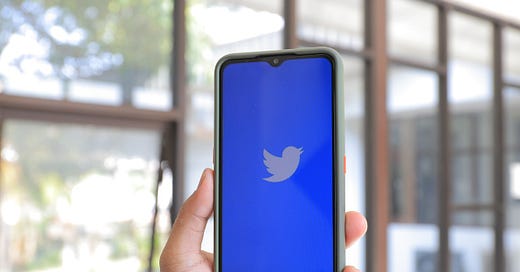An "everything app" that replaces your car
Twitter could become the mobility-as-a-service platform that gives users a seamless way to plan, book, & pay for transportation.
It’s almost dinnertime and I forgot to get bread to go with the spaghetti. Don’t panic, there’s time to fix this. Fresh Market has all the variety, but also 15 minutes away. Kroger is an easy five minutes. I whisk myself to Kroger, find the bread, and make my way to the self checkout. Reaching for my wallet—d’oh!—no wallet. I feel that burst of hot anger at myself, but then I see a sign that brings cool relief: Pay by Phone.
The self checkout screen brings up payment instructions. “Download the Kroger app.” They might as well tell me, “here’s one more way to fill up your phone storage and get more spam.” I don’t have my wallet, so what choice do I have? Install app.
The welcome screen asks for my phone number, no problem. And then “enter credit card.” My credit card that I left at home? An employee comes to help, quizzing me with his eyes. He explains the perks of the mobile app until I cut him off because at this point I’m hangry. It’s my own fault, but I’m headed back home to eat, breadless.
The story didn’t actually end that way, because the grocery store had a Google Pay option. But I’ve been in stores where the option is either traditional payment or “pay through our custom app.”
Are there too many apps? GovTech magazine was asking that in 2016. We’re bombarded with apps for every store in every industry. Using mobile apps can be the equivalent of fumbling through purses and wallets for loose change and the right coupons. Unfortunately, that’s the mindset so many transportation providers have been stuck in. Transit, rail, bike share, ride hailing… everyone is so worried about customers using a competing mode from time to time that they insist on having their own apps.
Transportation operators and passengers all have some degree of app fatigue.
Passenger pain: hassle, inconvenience, privacy concerns of downloading new apps.
Operator pain: convincing everyone to download new apps in order to increase ridership.
It’s a lousy experience for customers, and it doesn’t have to be this way. Maybe Elon Musk’s goal of making Twitter an “everything app” will help expand our imaginations.
Twitter could become the Mobility-as-a-Service app we’ve been waiting for!
Maybe it will, maybe it won’t, but the potential is there because
the concept has been proven with WeChat, and
Elon Musk is moving Twitter in the direction of a super app.
WeChat is China’s ubiquitous app that’s integrated into every part of Chinese life. Grab is a similar super app. Banking, investing, shopping, traveling, and service industries are all accessible from a single platform. No need to download a dozen apps for a dozen activities.
Encrypted messages and payments are two of the coming features that would play important roles in any MaaS platform, and they’re apparently headed our way. Integrating mobility into Twitter may be a much faster way for Americans to finally get the benefits of MaaS. Several technology and automotive companies are making attempts at mobility platforms, but they’re struggling with the profit angle. Twitter’s advertising and Twitter Blue may be the revenue generator that mobility professionals have longed for.
There are other innovations for mobility payments, and who knows, maybe concepts like Zero-Dollar Transportation will be wrapped into the evolution of Twitter.
Here’s what I’d hate to see happen: urbanists ignore the tremendous possibility of an everything app because they dislike Elon Musk. It’s good of you to be skeptical of any billionaire, but please don’t let their wealth or personality cloud your judgment of how their product(s) could improve the future of mobility.






